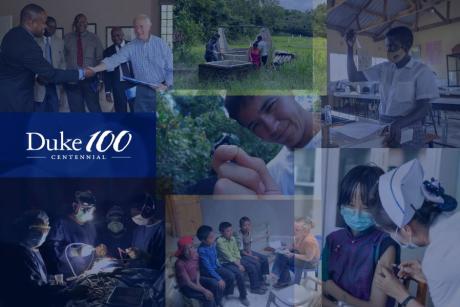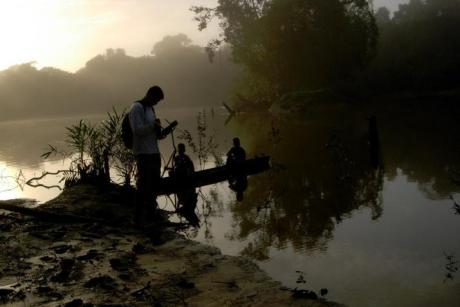
Sarah Diringer, PhD candidate and global health doctoral scholar, dissects fish from the river in Madre de Dios, Peru, to determine dietary risk to local communities from mercury
Published January 26, 2016, last updated on April 21, 2016 under Education News
Sarah Diringer, a PhD student in civil and environmental engineering and global health doctoral scholar, wants to apply her knowledge to issues that affect people worldwide.
Through her research, she’s seeking to understand how human activity, such as mining or energy generation, affects the local and global cycling of naturally existing toxic compounds, such as heavy metals, in the environment. She believes these insights will deepen our understanding of environmental and human health.
As a doctoral scholar, Diringer brings a strong foundation in environmental science and engineering to a diverse team. Diringer’s PhD advisor, civil and environmental engineering professor Heileen Hsu-Kim, introduced her to global environmental health professor William Pan and brought her onto their joint study on heavy metals and epidemiology in Peru.
For her dissertation fieldwork, she collected sediment, water and fish samples along the Madre de Dios River in Peru. Through this research, the team determined that the health risks taken on by local artisanal, small-scale gold miners extend far beyond the miners themselves. The mercury accumulates in fish, leading to hazardous levels of the neurotoxin in the food chain for at least as far as 350 miles away. The team’s dietary risk assessment revealed that, based on thresholds set by the World Health Organization, people living in mining areas cannot safely consume carnivorous fish.
Published in the journal Environmental Science: Processes & Impacts, the study was the first of its kind to look at the wide-reaching effects of mercury contamination from gold-mining operations in this Amazon region.
Diringer’s work on the study, along with Pan’s guidance, has given her a much deeper appreciation for how complex the political, environmental and health issues are in the Peruvian Amazon.
“Being a part of the doctoral scholars program has allowed me to work closely with great mentors at DGHI while pursuing my research,” Diringer said. “Dr. Pan has really helped me understand how my dissertation can address global health issues. And I particularly appreciate how the program has enabled me to connect two research worlds: a chemistry lab and a remote field location.”
In the future, Diringer hopes to work in environmental health as a scientist, consultant and advocate.


